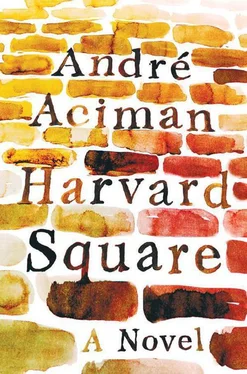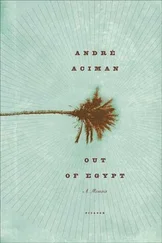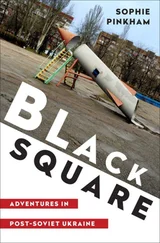All that echoed in our minds as each said goodbye and finally made his way back to a place neither could in good conscience call a home was the evening’s attempts at French wit in a language we spoke with joy and bitterness in our hearts, because we spoke it with the wrong accent, because it was our mother tongue, but not our native tongue. Our native tongue — we didn’t even know what that was.
A Berber by birth, Kalaj had grown up to love France in Tunis, while I, since childhood, had worshipped Paris in Alexandria. Tunis had no more use for him when he jumped a navy ship in Marseilles at the age of seventeen than Egypt had for me when it expelled me for being Jewish when I was fourteen. We were, as he liked to boast when we’d run into women at a bar, each other in reverse.
He had as little patience for Islam as I for Judaism. Our indifference to religion, to our people, to the never-ending conflict in the Middle East, to so many issues that could easily have driven a wedge between us, our contempt for patriotism, for flags, for causes, or for any of the feel-good ideologies that had swept through Europe since the late sixties, left us with little else than a warped sense of loyalty — what he called complicité , complicity — for anyone who thought like us, who was like us. There was, however, no one else like us. I’m not even sure we knew what “being like us” meant, since we were so different. We adhered to nothing, nothing clung to us, nothing ever “took.” Our capital was an imagined Paris. Our country the two of us. The rest was bunk. De la merde . Passports were bunk. Newspapers were bunk. Cambridge was bunk. My exams were bunk. The books I was reading were bunk. The massive Checker cab he drove every day, which his nemesis called le Titanique, was bunk, his women, his green card application that never seemed to be headed anywhere, his lawyer, Casablanca, his impacted wisdom teeth, his first wife, his second wife, his marriage to the second wife before he’d divorced the first and whom he’d grown to hate no less than the first, because both, in the end, had kicked him out of their lives, because everyone was always kicking him out of their life, all, all was bunk. Even the personals, which he loved to read on the day they were published in the Boston Phoenix , were bunk, just as his replies, which I had to write for him in English, were pure bunk. He contradicted everyone and everything because in contradiction he heard his own voice, but no sooner had he heard it than he’d turn around and contradict himself and say he was as full of bunk as the next fellow. In the end, even France, when we’d talked long and hard enough about it, was bunk. The only exception, he said, was family and blood. His youngest brother, his mother, even his sister who ran away with an Algerian in Paris and whom he refused to have anything to do with though he kept sending her occasional care packages from America. And perhaps, in the end, he included me as well in his tiny clan. For us he’d have laid down his life. He must have known, as I’d always known, that for him I probably lacked both the courage and commitment to risk a thing.
If I did help him, as I did when I spent hours coaching him for his interview with Immigration Services, it was probably either without thinking or because I couldn’t come up with a good enough excuse not to. Or maybe I did it to take my mind off my own work, to feel that I was doing something worthwhile besides reading all these books I knew I’d probably never reread. He thanked me profusely and said that help came so seldom in his life that he knew how to value those who had any to give. I dismissed the whole thing and said it was nothing. He insisted I was wrong, that a sure sign of being a good friend was the inability to see how good a friend one was. I knew better than to start arguing the point. My gesture had come too easily, carried no risk, no obligation, no scruple, no hesitation or difficulty to overcome. I knew the difference between a good deed and instant charity tossed like a cheap coin on a salver. “Let’s just say it made you happy to help me,” he added to cut short our discussion as we left Café Algiers one day after consuming five cups of coffee. His profuse thanks was probably meant to veil what he’d always suspected: that for me he was no more than a buddy in transit, while I was the long-lost sibling he never knew he had until we’d crossed paths in Café Algiers. “One day you’ll have to tell me why you’ve allowed me to be your friend,” he’d say, “and then I’ll tell you why as well. But you’ll have to speak first.” When he said things like this, I’d always throw him a vacant Come again? What are you talking about? stare. “One day,” he’d repeat after sizing up my intentionally blank gaze that hadn’t fooled him.
If we read each other so well it was also because the other thing that bound us was our very peculiar scorn for everything and everyone. Our scorn expressed itself differently, but it must have flowed from the same wellspring of self-hatred. Mine was a festering boil filled with bile and muted resentments; his erupted with rage. No one starts as a self-hater. But rack up all of your mistakes and take a large enough number of wrong turns in life and soon you stop trying to forgive yourself. Everywhere you look you find shame or failure staring back.
He had that. I had it too. Blunders everywhere, each damning in its small, insidious way. Blunders and bunk. Bunk was our protest, our way of talking back. He shouted bunk and boolsheet the way you pour alcohol over a wound you hoped wouldn’t grow worse. You said bunk to deal the first blow. To have the last word. To show there was more where that came from. To check out so you wouldn’t have to fold in front of the others. We shouted bunk at ourselves as well. Bunk was the last thing you said to shore up your pride, the last stop on a shaky landfill called dignity. After that, you wept.
I saw him weep twice. The first time was when he learned that his father in Tunis had been rushed to the hospital with peritonitis. After that, no letters, no phone calls, complete silence from Tunis. Meanwhile, here he was, holed up in far-flung Cambridge. He was, like a character in Casablanca , a stranded soul waiting for letters of transit that never came, striking up all manner of friendships in dubious establishments. Why was he in Casablanca? Well — as Bogart says in the film — he’d been misinformed. He should never have come here. But here he was, like a lone gunrunner in a world that had grown tired of galled, self-hating anti-heroes, because anti-heroes themselves had long become bunk and passé.
He was not crying for his father only. He was crying for himself, because he couldn’t take the first flight out to Tunis, because he couldn’t go back poorer than when he’d left seventeen years earlier, because leaving now meant he’d never be allowed back to the U.S., because he was ashamed of who he’d become. He was trapped. I had never seen someone pound his head with both fists before. But pound it he did, until I clenched his fists and told him, “Stop, stop, for the love of God stop hitting yourself.”
Neither of us believed in God. I put my arm around him. I had never done this before. He continued to sob against my shoulder, I could feel his chest heaving, and heaving again, then he burst out laughing. Twenty minutes later he was telling everyone in the café that he had sobbed in my arms like a woman, just like a woman, he repeated.
I knew what he was doing.
Behind his rage, his volcanic eruptions, and hyperbolic indictments of mankind whole, he had never grown up. He thought or pretended he had. The worst you could do to him was to spot the boy of seventeen. This is where his life had stopped. All the rest was error and bunk.
Читать дальше












